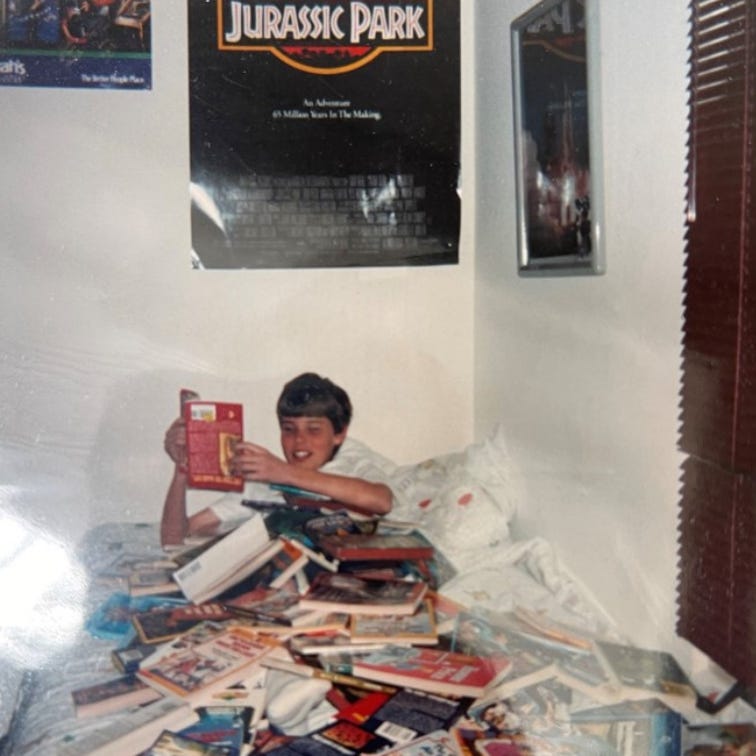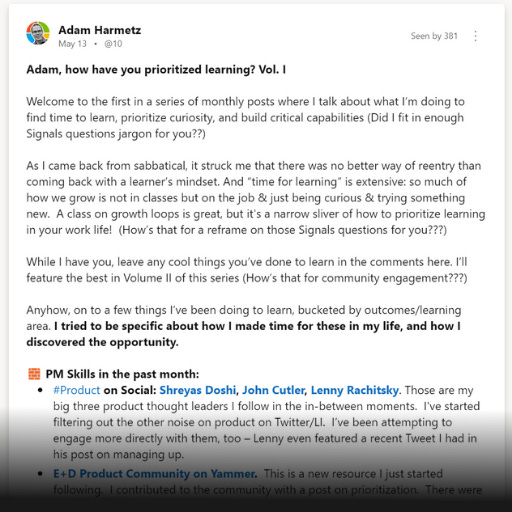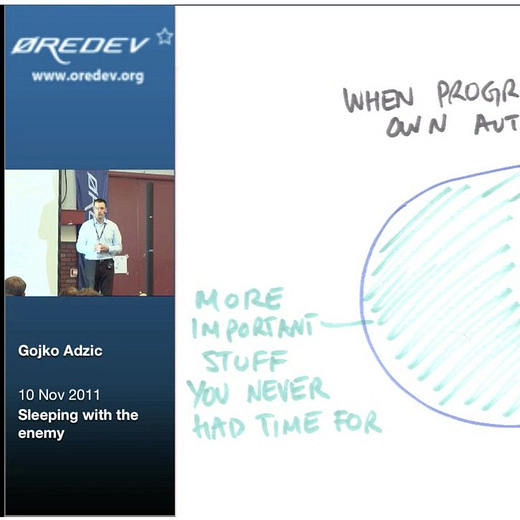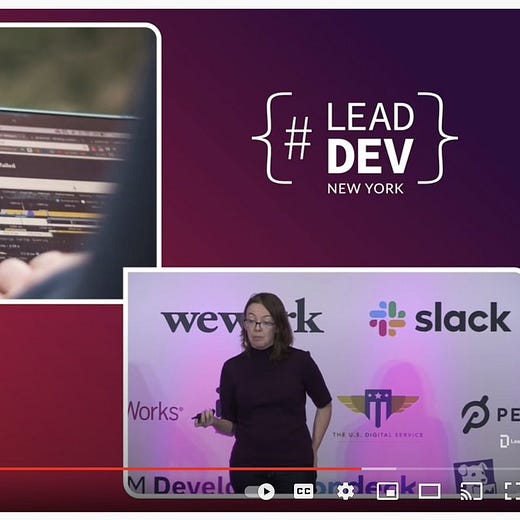Learning has been a dominant theme of my life. As the son of a teacher, I was given the gift of a love of learning at an early age. It carried through to my academic career - where I found pride and self-motivation to always do the extra credit - and in college, where I stayed an extra year to complete a double major across two disparate domains and wallow in the environment longer.
I had a very strong early career in product because of this motivation to make a learning moment out of any situation. Learning about customers, learning about stakeholders, learning about how to get things done: this is how I earned the extra responsibilities and quick promotions. Others may have had rock star rewards for one particular year, but it was this ability to more quickly grow that created separation from the pack over time.
Yet there are times in life when many of us can lose our way. For me, the pandemic will be a moment I’ll remember when I lost the spark and love of learning. Perhaps it was because my learning turned more towards research into viruses and health curves and what was causing us fear and uncertainty. Perhaps it was because the pandemic caused us to prioritize survival over thriving. Perhaps it took me a while to figure out how to learn when the office was reduced to square boxes of video all day. Other people managed this better - hey, learning to bake bread was a meme - but for me, whatever it was, I lost something important to my worldview.
In that sense, my sabbatical - timed for when the pandemic phase ended and we moved to an endemic phase - was a reset moment for me. It was a chance to rediscover this life-long love. I prioritized doing thing I wasn’t very good at. I prioritized rediscovering a love of reading history books. I prioritized being curious about the future. In short, I sought out learning in my life again.
In my return to work, I’ve prioritized a learner’s mindset as I onboard back, steeped in the fresh scar that it’s not a trait anyone is born with but must constantly be earned. As a leader, this was also a chance to work in the open and model a learning journey that others can follow. Going forward, I’ll also be the executive sponsor for the Learning cultural programs within our organization, so it’s top of mind for me.
Today’s post shares my journey for injecting a learner’s mindset into an organization.
Why is a Learner’s Mindset Important?
This biggest misconception about unlocking an organization that prioritizes learning is associating learning solely with lectures and the classroom. A majority of learning happens on the job or is self-directed and incorporated into daily routines like podcasts and retros. Modern skill growth requires a mindset shift on how to live and involves being awoke to the moments of learning around us.
It’s also worth remembering that many of us leaders were educated in the 20th century and how younger generations learn is different. I’ve been listening to Esther Wojcicki’s How to Raise Successful People, which talks a lot about this.
Beyond that, here are four key points that influence my approach:
For introverted leaders, showing curiosity is how you bond. Extroverted leaders have it easy. They thrive on connection and it’s easier to feel warm and supported by an extroverted leader. If you are an introvert and a leader, having a learner’s mindset - and constantly showing curiosity - is your secret sauce to still making the connections and creating the environment for people to thrive. I’ve felt this myself throughout my career: when a leader shows genuine interest in my ideas and projects - or is just curious first vs. judging - I’ve found myself most energized. It’s a great opener.
It’s key to psychological safety. A learn-it-all culture and not a know-it-all culture is a safe place to take risks. To be curious about the low percentage shots. To be OK saying, “I don’t know, but I think we can find out.” I’ve seen this transformation over the years as we moved from building on premises software (where there was no iteration possible so we have to know the right answer) to cloud delivered services (where we hypothesize, experiment, and iterate). Our ambition - when measured over the years - has gone up 100x as a result of the mindset shift.
It’s tied to creativity. I’m still enthralled with the book Imaginable by Jane McGonigal about how to think 10 years in the future. Her premise is that it’s not about being right, it’s about using the future as a tool to spark creativity and imagination. Being unsure if you are right is the only way to be creative. All of the 0→1 product making in my career has been steeped in inquisitive openness prior to conviction.
It’s strongly related to diversity and inclusion. As I am more intentional about what I’m doing to learn, I’m rediscovering just how much overlap there is between learning about a market or industry, improving product skills, and being curious about different cultures and minority experiences. It’s about putting yourself in the shoes of others and engaging to get results and insights. For example, I’ve prioritized diverse authors in my fiction reading in order to incorporate D&I into my hobbies - it enables me to ask what I can learn about a story told from a perspective different than my own.
Being curious and learning new things makes you a more interesting leader and person. It enables you to engage with your team about their interests and gives you creativity and inspiration.
Three Things I’m Trying
Here are a few novel things I’m trying as a leader who wants to live and broadcast a learner’s mindset:
Being public about my learning. I always write a monthly note to my team. Over the years, sometimes it’s been on strategy, sometimes on culture, sometimes on product details. This round, it’s about how I prioritize learning in my life. Since there is a lot to grok in terms of learning being a habit vs. a class you take, I felt modeling was the right way to drive home the point.
Above is the start of the note I sent to my team about my own learning. I’ve included the full text at the end of this post.
Using learning to virtue signal: Aligning learning to my peers’ priorities. We have a lot of choices over what we learn, and there is always a desire to focus on our own discipline’s skillset. I’ve been trying to break that mold and prioritize learning that enables me to support my partner disciplines. For instance, my engineering director is pushing hard on codebase maintenance and a testing/monitoring surge right now. I prioritized a few lectures I found on Twitter recently that dig into these topics. This enables me to reinforce what’s important and support my colleagues.
Trying a “Pick 3” program. My observation about myself is that being public drives accountability for me to prioritize learning. On the margin, I’ll pick the path of learning something new because now I know I need to talk about it. I’ve been noodling on ways to scale that out to others and I have a half-formed idea of a “Pick 3” program.
The idea is to form cohorts of students who want to hold each other accountable. They agree to pick three learning moments every week and share what they did with each other. The learning moments could be a class, but more commonly should be other forms of embedded learnings: retros, feedback sessions, industry podcasts, trying something new, or engaging in industry communities.
And hey, if you work at Microsoft and want to be a founding co-driver of Pick 3 for your org, reach out to me. Haven’t even started operationalizing this yet - just sharing it around for thoughts. And if you try something like this in your organization, drop me a line!
What Are You Doing To Learn?
I’m so thankful I was able to find the space to discover what was missing in my life. Since coming back from sabbatical, I’ve had dozens of conversations with people who are struggling with the same things: finding purpose, compensating for a loss of energy and vigor, figuring out what’s missing in their post-pandemic life, and the need to reset and recharge. Reach out if you want a coffee chat about it and feel free to share with me on social ideas for learning that you’ve seen work!
P.S. As promised, here was my first post on what I did in the past month to learn. It was too long to fit above, so including it here at the end:
Adam, how have you prioritized learning? Vol. I
Welcome to the first in a series of monthly posts where I talk about what I’m doing to find time to learn, prioritize curiosity, and build critical capabilities (Did I fit in enough Signals questions jargon for you??)
As I came back from sabbatical, it struck me that there was no better way of reentry than coming back with a learner’s mindset. And “time for learning” is extensive: so much of how we grow is not in classes but on the job & just being curious & trying something new. A class on growth loops is great, but it's a narrow sliver of how to prioritize learning in your work life! (How’s that for a reframe on those Signals questions for you???)
While I have you, leave any cool things you’ve done to learn in the comments here. I’ll feature the best in Volume II of this series (How’s that for community engagement???)
Anyhow, on to a few things I’ve been doing to learn, bucketed by outcomes/learning area. I tried to be specific about how I made time for these in my life, and how I discovered the opportunity.
🧱 PM Skills in the past month:
#Product on Social: Shreyas Doshi, John Cutler, Lenny Rachitsky. Those are my big three product thought leaders I follow in the in-between moments. I've started filtering out the other noise on product on Twitter/LI. I’ve been attempting to engage more directly with them, too – Lenny even featured a recent Tweet I had in his post on managing up.
E+D Product Community on Yammer. This is a new resource I just started following. I contributed to the community with a post on prioritization. There were some awesome resources on retros that I found from the community.
PM Conn Keynote. I listened to the PM Conn keynote by Scott Belsky of Adobe while on a long-distance run.
Benedict Evans Newsletter. This newsletter on "What matters in tech?" is my favorite product/industry newsletter. I make time Sunday night or Monday morning to read through.
🙏 Leadership capabilities in the past month:
Feedback tour: Coming back from sabbatical was a chance to listen and be curious about where impact was hiding. I was amazingly thankful and humbled that <list of execs, redacted in this post> prioritized sharing perspectives with me on how to ramp back up. I've been collecting a list of "hard things that aren't true but should be" as a frame for all this.
Purpose-Driven Organization. While on a long car ride, I listened to this talk by a Harvard MBA professor on how to drive purpose into an organization. MSFT and Satya are primary examples.
Imaginable. Took two plane rides, but I breezed through the book Imaginable by Jane McGonigal on how to do 10-years future thinking. Not about being correct; it's about being curious. The premise that you can't be creative without being open to thinking about the future was powerful. Don't be afraid of being wrong.
Pathwise. My boss has sponsored me and many others for this class on leadership and psychology. I'm almost done with Year 2. This month's class was on personas, or how you show up differently depending on the social context.
👂 Customers & industry in the past month:
Going deep on frontline workers. Recently, I was pushed me to be curious about the strategy and customer problems here. I've prioritized learning about this segment and our customer success efforts to date by asking my calendar time to be tweaked to make various critical meetings in the space.
Acquired podcast on Nvidia. I had no idea about the innovation and "bet the company" strategy Nvidia has taken. So interesting to see their ambition for next 10 years in the omniverse and AI. Talk about a reframe from my impression of them as the company that gave me something to put in my spare PCI slot in the 1990's.
2 startup founders. Met with 2 founders of startups in the Viva space who managed to find me via networking. Really interesting to hear their perspective on market/opportunity and learn what's top of mind.
Next week: Creators Economy 2-hr Product Fest. This one is Coming Soon, but I'm really excited to get to sit in on a 2hr product demo fest of Creator Economy tools that was put together for product folks within MSFT.
🤝🏾 Culture & DE&I in the past month
DE&I Coffee with Customer Series: People of Color Without Reliable Internet. The Customer-Driven Leadership Program hosted a panel of 6 people of color who don't have reliable internet. It drove a lot of awareness for me on the subsidizing housing market and how technology was something that "happened upon" these panel members vs. a sense of control.
Diverse voices in my fiction. I try to prioritize diverse voices in the fiction I consume. It's a great way to have a drip of DEI in my everyday life and learn while doing a hobby. Been on a long kick to prioritize female science fiction (finished Clockwork Boys by Kingfisher, a pen name for Ursula Vernon) and with Pride coming up next month, I prioritized watching Heartstopper on Netflix after I heard great things about it on social/from friends, especially for the all LGBTQ+ cast telling the story of love and hardship and coming out while coming of age in a heartwarming way.
I really didn’t think my list would be this long until I started tracking it. Your list might be longer than you think! And don’t forget to leave thoughts in the comments & things I can feature in a Community section in Volume II.
Reach out if you want to do any learning together (book club, podcast debrief) in the next month, too!










Your insights are simple and yet very powerful. I plan to try some of the ideas with my team for sure. Look forward to more of your future posts.
"learn it all" is a powerful mindset, and I am trying to approach every problem with this approach. Thanks for the insights based on your personal experience, Adam :)